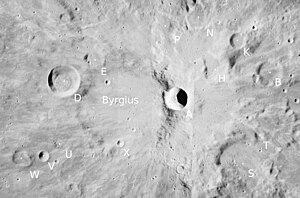Byrgius (crater) (original) (raw)
From Wikipedia, the free encyclopedia
Crater on the Moon
Feature on the moon
Byrgius
 Lunar Orbiter 4 image of Byrgius, with Byrgius A at right, and Byrgius D in upper left Lunar Orbiter 4 image of Byrgius, with Byrgius A at right, and Byrgius D in upper left |
|
|---|---|
| Coordinates | 24°42′S 65°18′W / 24.7°S 65.3°W / -24.7; -65.3 |
| Diameter | 87 km |
| Depth | 4.6 km |
| Colongitude | 65° at sunrise |
| Eponym | Joost Bürgi |
The rays of Byrgius A extend for hundreds of km, and it is the brightest feature in the region.
Byrgius is a lunar impact crater located in the western part of the Moon, near the limb. As a result, Byrgius appears strongly oval in shape due to foreshortening. To the northwest is the nearly ruined crater Lamarck. The rim of Byrgius is worn and eroded, with Byrgius A overlying the eastern rim and Byrgius D lying across the northwest. The floor is relatively flat and undistinguished by significant craters. Byrgius A possesses its own ray system that extends for over 400 kilometres.
By convention these features are identified on lunar maps by placing the letter on the side of the crater midpoint that is closest to Byrgius.
| Byrgius | Latitude | Longitude | Diameter |
|---|---|---|---|
| A | 24.5° S | 63.7° W | 19 km |
| B | 23.9° S | 60.8° W | 23 km |
| D | 24.1° S | 67.1° W | 27 km |
| E | 23.5° S | 66.2° W | 18 km |
| H | 23.7° S | 62.4° W | 27 km |
| K | 23.0° S | 61.8° W | 14 km |
| N | 22.3° S | 63.1° W | 20 km |
| P | 22.6° S | 64.1° W | 19 km |
| R | 26.5° S | 60.7° W | 7 km |
| S | 26.2° S | 61.4° W | 43 km |
| T | 25.1° S | 61.5° W | 5 km |
| U | 25.8° S | 67.2° W | 13 km |
| V | 26.0° S | 67.8° W | 9 km |
| W | 26.1° S | 68.5° W | 14 km |
| X | 25.7° S | 65.4° W | 6 km |
Andersson, L. E.; Whitaker, E. A. (1982). NASA Catalogue of Lunar Nomenclature. NASA RP-1097.
Blue, Jennifer (July 25, 2007). "Gazetteer of Planetary Nomenclature". USGS. Retrieved 2007-08-05.
Bussey, B.; Spudis, P. (2004). The Clementine Atlas of the Moon. New York: Cambridge University Press. ISBN 978-0-521-81528-4.
Cocks, Elijah E.; Cocks, Josiah C. (1995). Who's Who on the Moon: A Biographical Dictionary of Lunar Nomenclature. Tudor Publishers. ISBN 978-0-936389-27-1.
McDowell, Jonathan (July 15, 2007). "Lunar Nomenclature". Jonathan's Space Report. Retrieved 2007-10-24.
Menzel, D. H.; Minnaert, M.; Levin, B.; Dollfus, A.; Bell, B. (1971). "Report on Lunar Nomenclature by the Working Group of Commission 17 of the IAU". Space Science Reviews. 12 (2): 136–186. Bibcode:1971SSRv...12..136M. doi:10.1007/BF00171763. S2CID 122125855.
Moore, Patrick (2001). On the Moon. Sterling Publishing Co. ISBN 978-0-304-35469-6.
Price, Fred W. (1988). The Moon Observer's Handbook. Cambridge University Press. ISBN 978-0-521-33500-3.
Rükl, Antonín (1990). Atlas of the Moon. Kalmbach Books. ISBN 978-0-913135-17-4.
Webb, Rev. T. W. (1962). Celestial Objects for Common Telescopes (6th revised ed.). Dover. ISBN 978-0-486-20917-3.
Whitaker, Ewen A. (1999). Mapping and Naming the Moon. Cambridge University Press. ISBN 978-0-521-62248-6.
Wlasuk, Peter T. (2000). Observing the Moon. Springer. ISBN 978-1-85233-193-1.
 Media related to Byrgius (crater) at Wikimedia Commons
Media related to Byrgius (crater) at Wikimedia Commons

